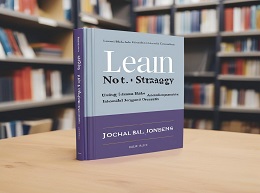The Lean Strategy: Using Lean to Create Competitive Advantage, Unleash Innovation, and Deliver

The Lean Strategy
"The Lean Strategy: Using Lean to Create Competitive Advantage, Unleash Innovation, and Deliver Sustainable Growth" by Michael Balle, Daniel Jones, Jacques Chaize, and Orest Fiume, is a transformative guide for organizations aiming to integrate Lean principles into their core operations. This book offers a comprehensive approach to using Lean not just as a set of tools, but as a strategic framework for achieving long-term success.
The Evolution of Lean Thinking
The authors emphasize that Lean is often misunderstood as merely a collection of tools for improving efficiency. Instead, they argue that Lean is a holistic strategy that reshapes how organizations think and operate. By shifting focus from short-term gains to long-term strategic goals, Lean becomes a driver of sustainable growth and competitive advantage.
Aligning Lean with Organizational Goals
One of the central themes of "The Lean Strategy" is the importance of aligning Lean principles with the organization's strategic objectives. The authors provide practical advice on how to integrate Lean thinking into the company’s vision and mission. For instance, Toyota, a pioneer of Lean, aligns its production system with its overarching goal of quality and customer satisfaction, demonstrating how strategic alignment can lead to remarkable success.
Focusing on Customer-Centric Innovation
A core aspect of Lean strategy is the relentless focus on creating value for customers. The book highlights how companies can use Lean to understand customer needs deeply and innovate accordingly. The case of Amazon is particularly illustrative; by continuously refining its processes to enhance customer experience, Amazon has maintained its competitive edge and achieved significant growth.
Encouraging a Culture of Continuous Improvement
Lean is inherently about continuous improvement (Kaizen). The authors explore how fostering a culture that encourages every employee to contribute to innovation can lead to significant breakthroughs. For example, at 3M, the Lean approach has empowered employees at all levels to suggest and implement improvements, leading to a steady stream of innovations and improvements in products and processes.
Building Resilient and Adaptive Organizations
Sustainable growth is a key outcome of an effective Lean strategy. The book details how Lean helps organizations build resilience and adaptability, enabling them to navigate market changes and disruptions. The story of Danaher Corporation, which has successfully implemented Lean across its diverse portfolio of companies, underscores how Lean can drive sustainable growth by fostering agility and continuous improvement.
Real-World Examples and Case Studies
The authors enrich their theoretical discussions with numerous case studies and real-world examples. For instance, the transformation of a European manufacturing company through Lean principles showcases tangible benefits such as reduced lead times, improved quality, and increased customer satisfaction. These examples serve to illustrate how Lean can be effectively applied across various industries and organizational contexts.
Overcoming Resistance and Ensuring Commitment
Implementing Lean strategy is not without its challenges. The book addresses common obstacles such as resistance to change, lack of understanding, and insufficient commitment from leadership. By providing strategies to overcome these barriers, such as robust training programs and strong leadership support, the authors equip readers with the tools needed to ensure successful Lean implementation.
The Future of Lean Strategy
In "The Lean Strategy," the authors present a compelling argument for adopting Lean as a strategic imperative rather than a set of operational tactics. By doing so, organizations can unlock unprecedented levels of innovation, efficiency, and growth. As businesses face increasingly complex and competitive environments, Lean offers a proven framework for achieving sustainable success.
Embracing Lean for Long-Term Success
"The Lean Strategy" is an essential read for business leaders and managers seeking to understand how Lean can be used to drive strategic goals. By combining practical advice with real-world examples, the authors provide a comprehensive roadmap for integrating Lean into the core fabric of an organization. Embracing Lean not only enhances operational efficiency but also fosters a culture of continuous improvement and innovation, paving the way for long-term success.













